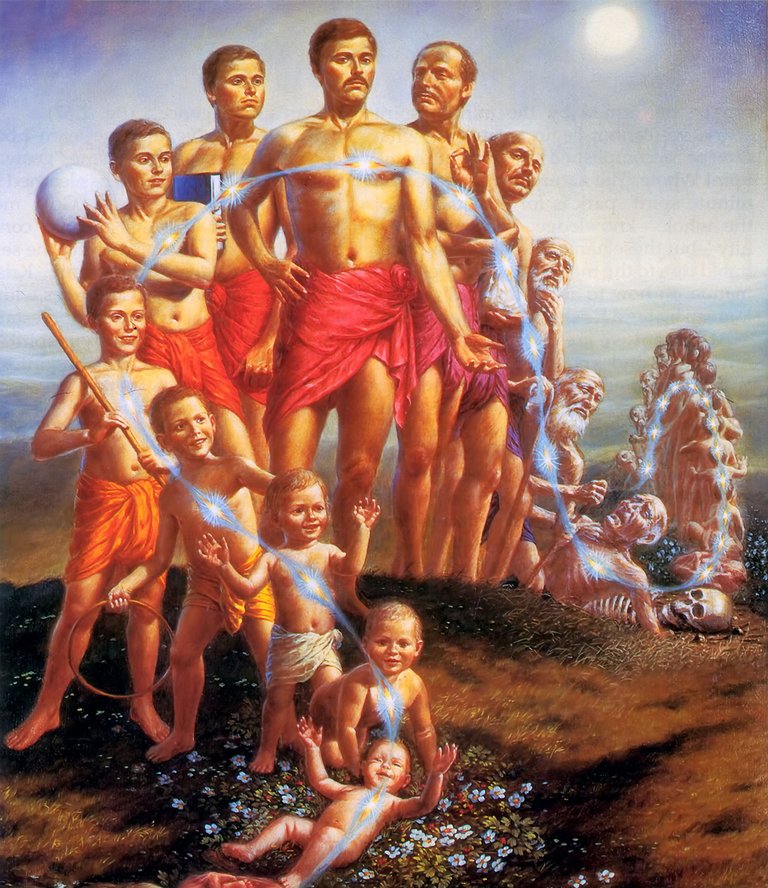I remember when I was a pretty young kid, around five or six, I happened to turn on a movie when I was sick at home one day. I turned it on during one scene. There had been a murder (I think) in a place where there was a set group of people. It might have been a ship. The group of people were standing around and I remember one of the characters said "One of this group has no soul". It was then implied that this person with no soul was the evil one, Satan or some demon. My family was religious so I was familiar with the idea, but seeing this scene absolutely terrified me. I turned off the TV and hid under my covers. For weeks it stuck in my mind and disrupted my sleep, with that line popping up in my head when I started to fall asleep.
Years later when I drifted to Buddhism, I encountered the idea that Buddhists don't believe in a soul. I couldn't help but be reminded of that movie scene that terrified me so much when I was a child. In the years since, I've encountered people here and there who put forth a similar idea, that the idea of no soul represents something wicked.
But... does Buddhism really believe that we don't have a soul? Let's look into it!


Usually beginner Buddhist books or lectures say that Buddhists don't believe there is a soul. If someone asks, "don't the Buddhist believe in multiple lives" the answers is "yes", but if the same questioner asks "If there is no soul, what continues from life to life" then the typical answer is "something, but not a soul".
Something continues. Well what? Something.
[Just a disclaimer here. I follow Sōtō Zen, which is a nominally a school of Mahayana Buddhism, though it's pretty unique among Mahayana sects in that it denies or just doesn't talk much about much of the more mythological (and frankly, weird) stuff in that branch of Buddhism. So anyway, that is to say what I talk about here might be different than you hear from, say, the Dalai Lama.]
What is this thing? Well, I'm going to say this something is a soul, but it's not quite The Soul as we picture it in Western (or Christian) thought. There is a good reason why Buddhists usually avoid using the word "soul", just as Buddhists usually avoid the word "God", because in English these words are loaded with a Christian context and we want to avoid transferring these ideas to Buddhism. Yet at the same time, I think it can be useful to use the same words, because some aspects are the same and so it can help us in understanding a new context.
Before we go further, we need to define what exactly Buddhism says. Buddhism lays out this idea of no soul mostly in opposition to Hinduism. Hinduism has what they call the ātman, which we usually translate this as soul. If you do yoga you are probably familiar with the word ātman. The ātman is an individual, unique soul. It's individual, unique, and non-changing. It is you. This will never change: it's always you and it's always exactly the same.

A typical image of the atman, showing as it moves from life to life
This soul in Hinduism continues with you for your entire life, then when you die, it moves on to the next body. It would not be incorrect to say the ātman changes bodies every lifetime in the same way that we change clothes every day. In the Bhagavad Gita, Shiva says
There was never a time that you, nor I, nor all these warriors assembled here did not exist. Nor shall we ever cease to exist in the future.
This is the idea, that we will always exist and that we have always existed, and that this will never change. Incidentally, George Harrison liked quoting this line after he became sick with cancer.
So that's the ātman.
When Buddhism came around, it said our idea is anātman (or anatta in Pali), which means "no ātman". It's negating the idea of the ātman. In this idea there is not an ātman that continues from life to life. This is usually translated as no-self in English.
So now we are back to where we began: something continues from life to life, but what?
Buddhists will say that when you meditate, the purpose of meditating is to see the truth that you are not your mind. Your mind is not you. We often associate ourselves with our minds; we think that either the mind is us or that our soul sits in the mind, directing it like a big robot.
Well, usually Buddhism says, well, no, that's not it. The mind is just a tool that serves us. We have many tools in this body. The heart beats and moves blood around the body, the lungs breathe and move air into the bloodstream, and the brain (or mind) thinks. But just as we don't confuse ourselves with the heart, we shouldn't confuse ourselves with the mind. We are not our mind.
We are instead the awareness that sits and watches the mind and unfortunately often confuses itself with the mind. An awareness that we might call the soul.
Now this is where we get into a language problem. The soul or the ātman of Hinduism and the soul of Christianity, these things are unchanging. Maybe they evolve, taking on new viewpoints as new information becomes available, but they do not change. The soul of Buddhism, however, is a changing soul. And that's why we say no-self, because there isn't anything permanent here, no unchanging soul, but there is something more akin to a river. Like a river, it is ever-changing. Let me try to illustrate that by example. Let's use the example of a university.
A university has two aspects. It has a physical aspect and a more abstract aspect. The physical part is all the buildings and the campus. And just like our physical body, this is constantly changing: buildings get old and are either repaired or destroyed, campus expands and new buildings go up, or sometimes it contracts. The other aspect of the university is the student body and faculty, and the combined voices of these groups makes the "soul" of the university.
Just like the physical side of the university, the soul of the university is also constantly changing because every semester the student body changes. Some people graduate or drop out or transfer. New students enroll. Every few years the faculty also changes, with people quitting, transferring, or retiring. Some new faculty joins. All of the faculty and all of the students together, they create the voice or the soul of the university, and this voice is constantly changing as the people that make it up change. Sometimes the university is more liberal. Sometimes the university focuses more on a certain cause like ecology or women's rights or something like that. This might change a little bit every few years. Why does it change? Because the soul of the university changes.
It's still the same university. We still call it Harvard. We still call it Yale. Even though the body completely changes every now and then and the soul of it also is constantly changing, but it's still the same university. This is key to understanding. It is constantly different, but also always the same.

This reflects us fairly well. We are constantly changing. The person we were when we were 14 years old, for example, is not the same person we are right now. Oh, the two people might share some memories. Although the memories are probably different because the older person has altered the memories in the retelling and the recalling, but they are similar enough that these two people can say, oh, we're the same.
We have this awareness that we are constantly changing physically, but our soul is also constantly changing. Just like a university. Voices are constantly coming in to our soul. And voices are constantly leaving our soul. There's the language problem again. I don't mean to make it sounds like some multiple personality crazy person. Maybe awarenesses would be better than voices.
In this way, there is definitely some continuity in our soul. But it's also different. Not only that, but if we take our soul to different time periods that are far enough removed, then the soul will be completely different, just as the Harvard of 100 years ago is nearly entirely different than the Harvard of today.
In a long enough period, all of the voices will have been replaced. Maybe some of the ideas in memories will continue. Just like with the university, some of the collective memories continue. But the actual soul is different. It has changed, maybe retained some of the patterns of before, maintained a continuity, but it is not the same.
This is the Buddhist soul, the constantly changing soul.
So when we say something continues from life to life in Buddhism, this changing soul is what continues.
How does that look exactly? Well, maybe the soul that is reborn into a new body after this body dies, maybe it's almost the same as it was on our deathbed, but a few new voices have been added to the mix, and a few have been subtracted. Did they "die"? No, they just moved on to somewhere else, just as a university student sometimes transfers to another university. Then after a few years in the new body, well, maybe all of the voices from the previous body will have been replaced, making it completely new.
But, it must be remembered that even when all the voices of the soul have been replaced, a memory or a pattern might continue. You don't really remember experiencing anything that your 14-year-old self did because it wasn't you, but you are the heir to the memories (or some of them) of that 14-year-old person, providing some continuity.
Of course the "memories" of the soul are different than the memories of the brain. The brain is where we have facts and figures like 2+2=4. When we are reborn after the death of the body, well, these brain memories are gone and have to be relearned. The soul memories are more like personality traits.
Now I know that's kind of hard to picture, but this is essentially what Buddhism is talking about when they say there is no soul.
They say there is no soul because what continues is constantly changing. There is nothing to grab onto. It's like sand: you pick it up and it comes out of your hands.
Anyway, so this is the Buddhist soul. When Buddhists say there is no soul, you can take that as them saying "There is no unchanging, permanent soul", but there is a changing soul that changes like a university or a river.

Anatta is also often represented by an endless ocean
❦
 |
David LaSpina is an American photographer and translator lost in Japan, trying to capture the beauty of this country one photo at a time and searching for the perfect haiku. He blogs here and at laspina.org. Write him on Twitter or Mastodon. |

 Wes & Grindan
Wes & Grindan